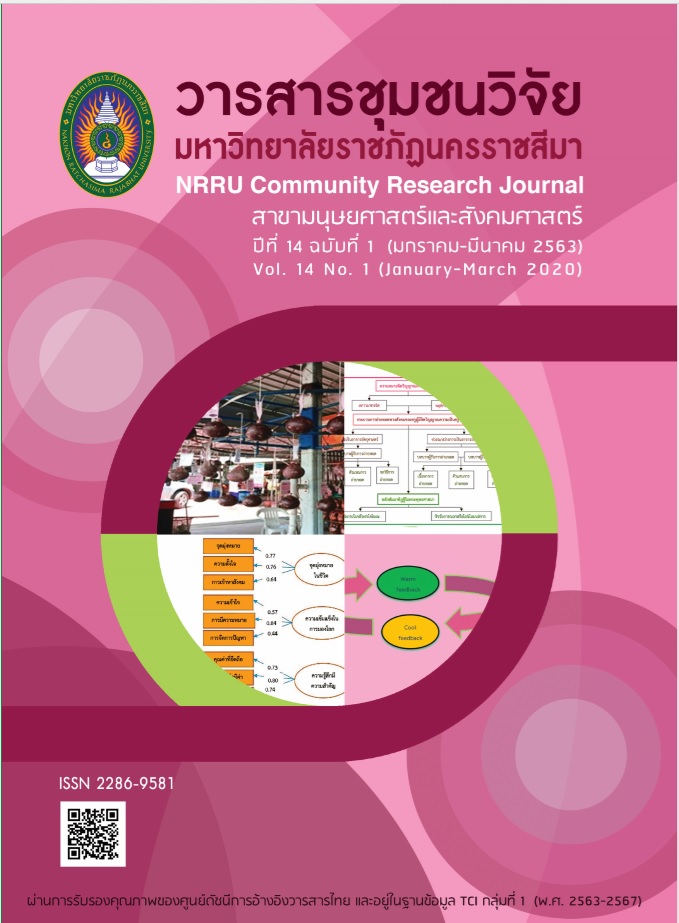ปัจจัยเชิงสาเหตุที่ส่งผลต่อการบริหารงานวิชาการของโรงเรียนประถมศึกษา สังกัดสำนักงานเขตพื้นที่การศึกษาประถมศึกษาในภาคตะวันออก
DOI:
https://doi.org/10.14456/nrru-rdi.2020.15คำสำคัญ:
ปัจจัยเชิงสาเหตุ, การบริหารงานวิชาการ, โรงเรียนประถมศึกษา, ภาคตะวันออกบทคัดย่อ
การวิจัยครั้งนี้มีวัตถุประสงค์เพื่อ 1) ศึกษาปัจจัยที่ส่งผลต่อการบริหารงานวิชาการ 2) สร้างโมเดลปัจจัยเชิงสาเหตุที่ส่งผลต่อการบริหารงานวิชาการ และ 3) ศึกษาปัจจัยเชิงสาเหตุที่ส่งผลต่อการบริหารงานวิชาการ ของโรงเรียนประถมศึกษา สังกัดสำนักงานเขตพื้นที่การศึกษา ในภาคตะวันออก ประชากรคือ ผู้อำนวยการสถานศึกษา และครูวิชาการหรือหัวหน้ากลุ่มสาระการเรียนรู้ของโรงเรียนประถมศึกษาของภาคตะวันออก 7 จังหวัด 14 เขตพื้นที่การศึกษา 1,613 โรงเรียน ๆ ละ 2 คน รวม 3,226 คน กำหนดขนาดกลุ่มตัวอย่าง 20 เท่าของตัวแปรที่ศึกษา 26 ตัวแปร ได้กลุ่มตัวอย่าง 520 ตัวอย่าง ใช้วิธีสุ่มกลุ่มตัวอย่างอย่างง่าย ด้วยวิธีการจับฉลาก เครื่องมือที่ใช้ในการวิจัยเป็นแบบสอบถามที่มีค่าความเชื่อมั่นทั้งฉบับ 0.98 วิเคราะห์ข้อมูลด้วยสถิติพื้นฐาน ได้แก่ ค่าความถี่ ค่าร้อยละ ค่าเฉลี่ย และค่าส่วนเบี่ยงเบนมาตรฐาน ทดสอบความสัมพันธ์ด้วยการวิเคราะห์ปัจจัยเชิงยืนยันและการวิเคราะห์โมเดลสมการโครงสร้าง
ผลการวิจัยพบว่า ภาพรวมของปัจจัยที่ส่งผลต่อการบริหารงานวิชาการอยู่ในระดับมาก ( =4.25, S.D.=0.52) โมเดลที่สร้างขึ้นมีความสอดคล้องกับข้อมูลเชิงประจักษ์ (
2=236.87, df=124, P-value=000, GFI=0.95, AGFI=0.92, CFI=100, SRMR=0.03, RMSEA=0.046, CN=859.30) และมีค่าสัมประสิทธิ์การทำนายของตัวแปรการบริหารงานวิชาการโรงเรียน เท่ากับ 0.93 แสดงว่าการบริหารงานวิชาการของโรงเรียน มีประสิทธิภาพร้อยละ 93
เอกสารอ้างอิง
Aramrun, C., Wongnaya, S., & Sompongtam, C. (2013). Academic Administration Strategy of Basic Education Schools under Kamphaeng Phat Service Area Office 1 and 2. JOURNAL OF EDUCATION NARESUAN UNIVERSITY, 15(4), 45-54. (In Thai)
Buller,J.E.(1996).A process for effect graphic design curriculum development. Dissertation Abstracts International, 11(4), 4254-A.
Celep, C., & Cetin, B. (2005). Teachers’ perception about the behaviours of school leaders with regard to knowledge management. International journal of Educational management.
Cheuchati, M., Niyomsrisak, S., & Wongnam, P. (2011) SMULTI-LEVEL FACTORS INFLUENCING THE ACADEMIC ADMINISTRATION EFFECTIVENESS OF SCHOOL PRINCIPALS UNDER THE OFFICE OF BASIC EDUCATION COMMISSION, EASTERN REGION OT THAILAND. Journal of Educational Administration Burapha University, 7(1), 56-67. (In Thai)
Cotton, F., & Ashley, B. (2003). Instruction leadership Proficiencies of elementary. Boston : Harvard Business school.
Cronbach, L. J. (1990). Essentials of psychological testing (5th ed.). New York : Harper Collins Publishers.
Hair, J. F., Jr. Black, W. C., Babin, B. J., Anderson, R. E., & Tatham, R. L. (2006). Multivariate data analysis (6th ed.). New Jersey : Prentice Hall.
Ministry of Education. (2008). Core curriculum for basic education, 2008. Bangkok : The Agricultural Co-operative Federation of Thailand, Printing house. (In Thai)
Office of the Education Concil. (2016). Thai educational conditions 2014-2015 How to reform Thai education to catch up with the world in the last century 21. Bangkok : Phim Dee Printing. (In Thai)
Office of the National Economic and Social Development Council. (2017). THE TWELFTH NATIONAL ECONOMIC AND SOCIAL DEVELOPMENT PLAN (2017-2021). Bangkok : Office of the National Economic and Social Development Board Office of the Prime Minister. (In Thai)
Phanich, W. (2012). The way to create learning for pupils in the 21st century. Bangkok : Sodsri-Saritwong Foundation. (In Thai)
Royal Thai Government Gazette (2007). Stipulate criteria and methods for decentralization of educational administration and administration, 2007 (B.E.2550). Retrieved August 11, 2016, from www.backoffice.onec.go.th (In Thai)
Runcharoen, T. (2007). School administration in the era of educational reform (4th ed.). Bangkok : S.T. Press. (In Thai)
Sarathha, W. (2013). New educational paradigm, case study perceptions towards 21st century education. Bangkok : Thippayawisuth. (In Thai)
Siriphon, B., & Suntharayuth, T. (2014). Budgeting and Asset Management Model to Secondary School Level Toward Excellence. Journal of Education and Social Development, 10(1), 223-234. (In Thai)
Sontamino, S. (2008). THE DEVELOPMENT OF KEY PERFORMANCE INDICATORS FOR EDUCATIONAL QUALITY ASSESSMENT OF BASIC EDUCATION SCHOOL BY BALANCED SCORECARD. Dissertation, Doctor of Education degree in Educational Administration, Burapha University, Chonburi. (In Thai)
Sujaritrak, P. (2009). School Management Indicators for Promoting Student Thinking Skills. Veridian E-Journal, Silpakorn University (Humanities, Social Sciences and arts), 2(1), 93-111. (In Thai)
Tharasisutthi, P. (2008). Principles and theories of educational administration. Bangkok : Ramkhamhaeng University. (In Thai)
Thepsut, P., Anegasukha, S., & Kitiyanuson, R. (2015). The Model of Learning Organization of Secondary School in The Secondary Educational Service Area Office 10 Through development The Body of Knowledge With Cooparative Community. AL-NUR JOURNAL, 10(18), 109-127. (In Thai)
Umla, T. (2008). THE MODEL OF ADMINISTRATION FOR PRIVATES SCHOOL AS JURISTIC PERSON. Dissertation, Doctor of Philogophy degree in Department of Educational Administration, Silpakorn University, Nakhon Pathom. (In Thai)
Vanichbancha, K. (2005). Statistics for research. Bangkok : Chulalongkorn University. (In Thai)
Wongjan, P. (2004). DEVELOPMENT OF A COMPOSITEINDICATOR OF QUALITY OF EDUCATION OF PRIVATE VOCATIONAL SCHOOLS. A Thesis for Major of Educational Research Technology, Graduate School, Burapha University, Chonburi. (In Thai)
Wongyuen, T. (2014). Academic administration. Retrieved Feburary 10, 2014, from http:// mystou.files.wordpress.com (In Thai)





